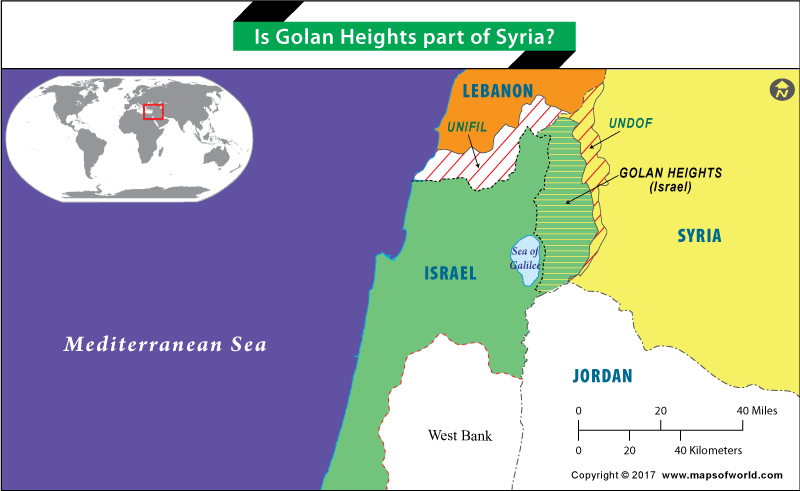

Map showing Golan Heights, which is controlled by Israel
The Golan Heights was part of Syria but lost the territory to Israel during the Six-Day War in June 1967. In the immediate aftermath, Israel began to move civilian settlers into the Golan Heights area.
During the 1973 Yom Kippur War, Syria tried to retake Golan Heights, and almost succeeded, before the Israeli Defense Forces pushed back the Syrian Army.
In 1974, the UN brokered an armistice between the two countries that left Israel occupying two-thirds of the western side of the area (500 sq miles), including the strategically important Golan Heights, with Syria retaining control over the remaining one third (218 sq miles). The UN took charge of 91 sq mile area on the ceasefire line and has placed the United Nations Disengagement Observer Force (UNDOF) there.
In 1981, in a unilateral move that took the world by surprise, Israel annexed the Golan Heights. The UN and most of the international community have not recognized this annexation and it remains a disputed territory under Israeli occupation.
Strategic importance of Golan Heights
Control of Golan Heights is critical to both Israel and Syria and the reason lies in its topography. The area borders Israel, Lebanon, Jordan and Syria. The Heights gives a view deep into Syrian territory, including Damascus, which lies just 60 km to the north. From the heights, one can also look deep into Israel.
This is why Syria was able to bombard Israel using artillery and the reason why it wants to retain control over the Golan Heights. From the top, Israeli military can keep an eye on any defense movement emanating from the Syrian side, to prevent an encore of the 1967 surprise attack.
Another reason is Mount Hernon. The tallest mountain in the area rises to a height of 2,743.2 meters and is home to the Israeli winter ski resort. More importantly, it remains a source of fresh water collected in the natural catchment area that feeds into the Jordan River. The river in turn caters to around 30% of Israel’s water needs.
The land in the lower regions is very fertile, unlike other parts of the region, and Israel has been developing the area for crop cultivation and vineyards.
People in Golan
Most Arab-Syrians left the area during and post the Six-Day war in 1967, however, around 20,000 Druze inhabitants remained. Around 10% are said to have accepted Israeli citizenship. Israeli settlers too have made Golan their home and an estimated 20,000 are reported to be living there.
Present day situation
Despite US intervention to broker a settlement of the Golan issue between Israel and Syria, the situation remains status quo.
The former Israeli Prime Minister Ehud Barak was ready to return a large part of Golan Heights to Syria during the 1999-2000 peace talks in return for recognition and lasting peace. Syria wanted Israel to move back to pre-Six Day War line but Israel was reluctant to do so and the reason was the Sea of Galilee.
The Sea of Galilee has been an important source of fresh water for Israel and so it was reluctant to hand back the eastern shores to Syrian control. The talks failed.
Subsequent attempts by the Obama Administration to broker a settlement could not proceed further with civil war breaking out in Syria during 2011.
The international community has still not recognized Israel’s position, while Israel on its part, continues to lobby for recognition of the Golan Heights as part of its territory.
Related Maps and Articles :
The Republic of Madagascar is an island country located in the Indian Ocean, off the…
The Euro is the official currency of the European Union. It is, however, not incumbent…
There are many countries or regions that are partially recognized by the UN, have disputes…
The Alaska Statehood Act was signed into law by President Dwight D. Eisenhower in 1958,…
The name Persia may, however, only be used to refer to Iran in some contexts.…
Hawaii is an Island State in the US. It is one of the 50 states…